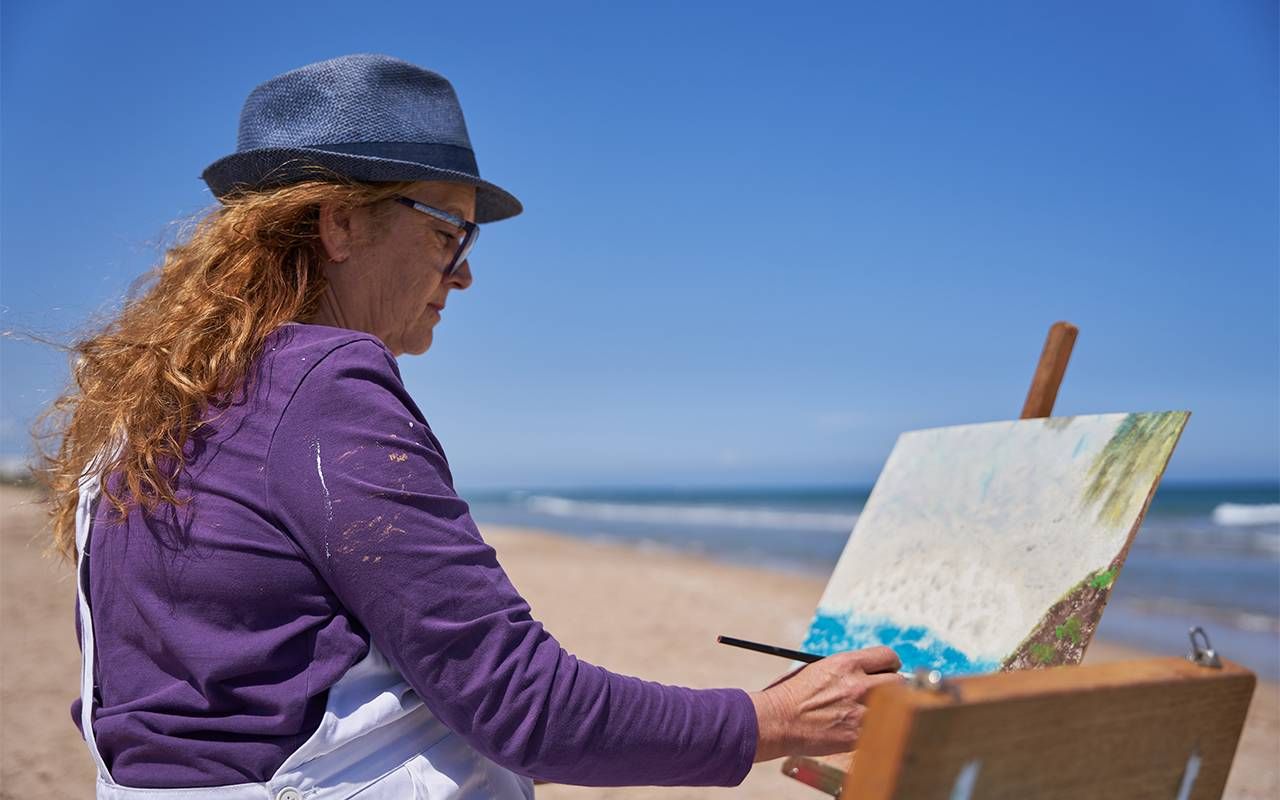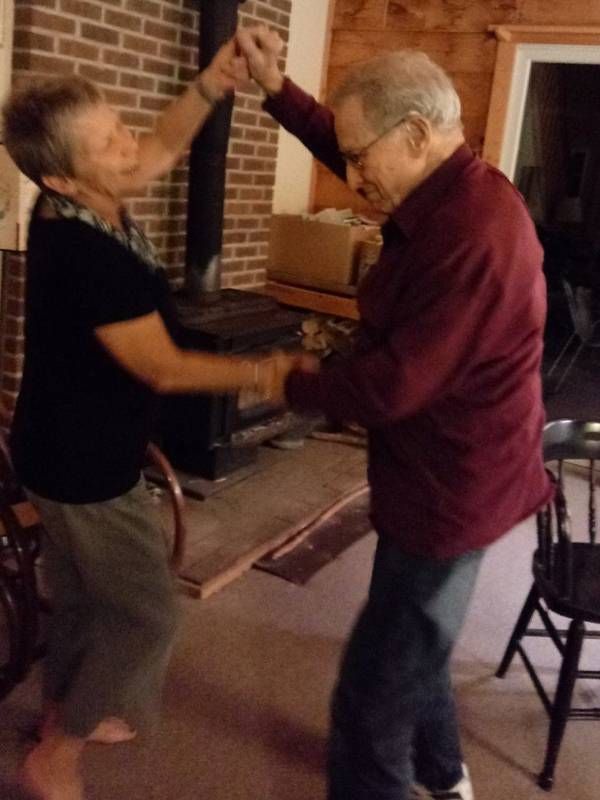The Geography of Grief
The loss of her father led to sadness and unexpected anxiety, but language, nature and the gift of distance brought comfort
"Drive safely," my father said, his drawl still noticeable despite not having lived in the South for 80 years. We were saying goodbye at his assisted living facility outside Harrisburg, Pennsylvania. Only later did I realize his send-off to me would be his last cogent message.

"I'm not driving, Daddy," I said. "I'm taking Uber to the airport tomorrow, and then flying home to California."
Even though my father was 101, I didn't expect it. Do we ever?
I've often pondered the timing of a person's death, and my father was no exception. I left Pennsylvania on a Wednesday morning. Thursday afternoon, the hospice nurse contacted my sisters and me to say he had gone into a sudden decline. He died a week later.
Even though my father was 101, I didn't expect it. Do we ever? His mental state had become wobblier in the previous six months, but physically he was sturdy, and had only recently started using a walker.
The Map of Grief
The nine months since my father died have been a terrain of highs, lows and unexpected curves. As the British theologian C.S. Lewis wrote, after the loss of his wife, Joy Davidman, "Grief is like a long winding valley, where any bend may reveal a totally new landscape."
I look back on the period since my father's death in sections: the gentle weeks before the memorial service, when I was at home with my husband in Eureka, California; and the more turbulent period after, when I was in Guanajuato, Mexico, where Barry and I live part of the year.
Only in the last twenty years of his life, when he finally became single, did I become very close to him.
In Eureka, Barry and I would paddle down winding tributaries in the bay near our apartment, watching the herons and seals. I took long walks with friends and by myself, listening to the Mormon Tabernacle Choir perform "Be Thou My Vision", which I had sung at my mother's funeral in the 70s.
My father not only outlived my mother by almost fifty years, he also survived two later wives and a girlfriend. Only in the last twenty years of his life, when he finally became single, did I become very close to him.
Despite the gentle texture of those weeks, I missed chatting with him on the phone. During COVID I called him every morning – often the highlight of my day. It didn't take much to make him laugh, and he brought out a playful side of me, too.
One morning during the pandemic, I phoned him during a showery walk. When it started to rain, I'd take shelter under a canopy of tree branches, where we'd chat. When the rain stopped, I'd hang up, race to the next tree, and call again. "Guess what! I'm dry! Briefly!" We'd both crack up.
Shaky at the Service
At the memorial service, I described my earliest memory of him. When I was five, Daddy was rowing on a lake towards my younger sister and me. We were waiting on the dock for our turn. I can still remember the calm, silvery water in the mist. It wasn't surprising, I said, that my first memory of him involved the outdoors, because he had instilled a love of nature in all his children. Then I gave examples of his legacy, and how each of my siblings in our different ways enjoyed being outside.
Although I felt my talk honored him, I couldn't stop shaking afterwards. When the service was over, thinking others might also feel fragile, I went up to each participant and thanked them for their contribution. I assumed they would also acknowledge what I'd said, but for some reason that did not happen, which left me in a state of heightened vulnerability that lasted for weeks.

My anxiety seemed to revolve more around family dynamics than grief, but who can say where grief starts and ends? It's all so marbled.
The Spanish 'R' Saved Me
After the memorial service, Barry and I flew down to our home in Guanajuato, a colorful, spirited place that always makes me happy. From previous losses I knew the importance of routines: brush teeth, make bed, cook dinner, wash dishes. But even in Mexico my mood didn't lighten much.
Late afternoons, I'd read in our patio, resting my eyes occasionally on our ficus tree and plants, the green so gentle and healing, it almost brought me to tears. With my tutor, I practiced the Spanish r and rr, which took my mind off what by then had turned into curdled resentment.
I'd ruminate over the service, sparing no one. This family member had gone on too long, this one was vapid. Between spurts of anger, I'd force myself to repeat potta tea, potta tea, potta tea, the soft English t that is a way station to para ti and the Spanish r.
Working on my pronunciation really helped. As a friend who has struggled with depression said, "You forget you're down when you're focusing on the Spanish subjunctive."
The Blessing of the Beach
What turned the tide – so to speak – was spending a week at the beach. Our Mexican hotel had a spacious outdoor area, with tables and chairs facing the ocean, and delicious morning coffee. The first day, I wrote in my journal: "I feel exhausted and I can't even explain why. Being here is the right place for a deep rest."
I remember now what I didn't before — that we all mourn differently, each in our own mysterious way, perhaps indecipherable even to ourselves.
Every morning I took a long walk, and in the afternoons I'd sit at a table facing the ocean, painting in my sketchbook.
Within a week, I was a different person. I wrote, "Walking on the beach, the world looms rich and thick… heel, arch, toe; rocks; pelicans; man with pail; sandpipers; breeze; warmth of sun on back; markings on sand; clouds; palm trees; shadows – all this in only 30 minutes!"
Back in Guanajuato, Barry built me a table, a dedicated space to paint. My "studio" was just a piece of plywood, but it worked magic: everyday I would lose myself in a watercolor world of burnt sienna and cobalt blue.
Grief Isn't Pretty
In the weeks after the memorial service, I saw, close up and unvarnished, that grief isn't pretty. Mine sure wasn't. Inwardly, I felt jealous, petulant and sour.
But I was fortunate. Not everyone's father lives to 101 or gets to go to a beautiful beach after their loved one dies.
With the gift of distance, I no longer feel angry or hurt. I remember now what I didn't before — that we all mourn differently, each in our own mysterious way, perhaps indecipherable even to ourselves. As Lewis said, we're following grief's "long winding valley," with its unpredictable bends, twists and turns.

